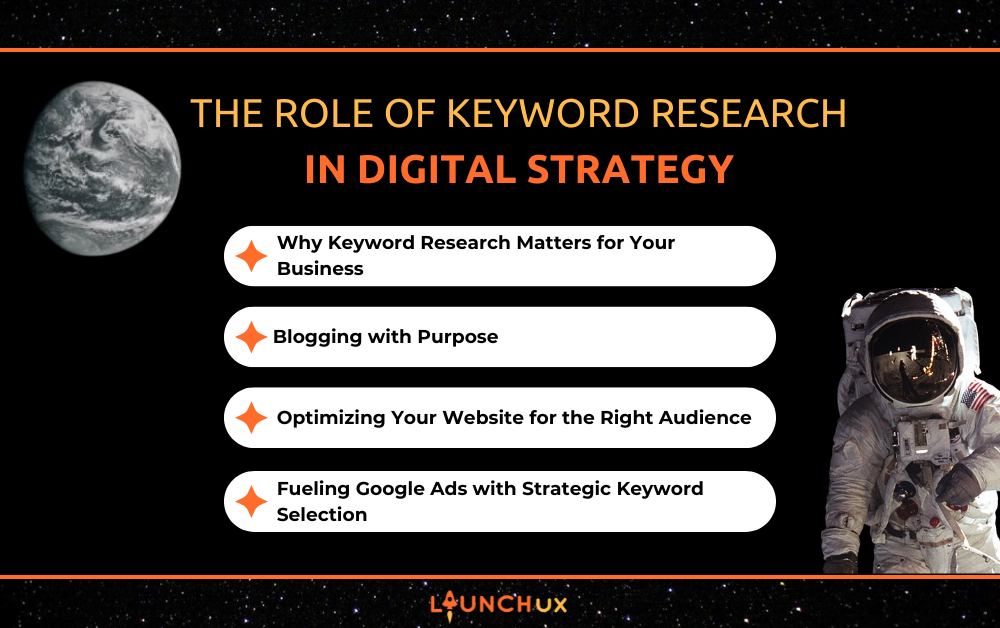If you’re a business owner looking to grow online, keyword research isn’t just a marketing buzzword—it’s the backbone of your entire digital strategy. By understanding the exact phrases your customers are typing into search engines, you can create blog posts that answer real questions, build website pages that rank for relevant terms, and run Google Ads that target high-intent buyers. In this blog, we’ll break down how keyword research powers your blog, website, and advertising efforts—so you can attract the right traffic and get better results from every piece of content you publish.
Why Keyword Research Matters for Your Business
Keyword research is one of the most important tools a business owner can use to grow online. It directly influences how visible your brand is in search engines and how effectively you reach new customers. Without keyword research, your marketing becomes guesswork instead of strategy.
It Helps Customers Find You First
When people search online for services or products, they’re using specific phrases. Keyword research shows you what those phrases are, so you can optimize your content to match. This increases your chances of showing up in Google results ahead of competitors. It’s the difference between being found—and being forgotten.
It Aligns with What People Are Actually Searching
Many businesses unknowingly create content using internal jargon or vague terms. Keyword research helps you understand how your audience talks about their problems and what language they use when searching. This allows you to tailor your messaging to real-world queries. When you match your content to user intent, you get more qualified traffic.
It Informs Smarter Business Decisions
Keyword data provides insight into what your audience cares about and how demand shifts over time. This can guide not just your content strategy, but your product offerings, service pages, and advertising efforts. By focusing on high-value keywords with strong search volume, you ensure your efforts are aligned with actual market demand. In short, keyword research helps you prioritize what matters most to your customers.
Blogging with Purpose: Using Keyword Research to Drive Organic Traffic
Blogging can be a powerful tool for bringing new visitors to your site, but only if it’s backed by strategy. Keyword research helps you create blog content that answers specific questions your audience is actively searching for. Instead of publishing random topics, you’re building content that ranks, resonates, and converts.
Choosing the Right Blog Topics
Keyword research gives you clarity on what people want to read. By targeting keywords with solid search volume and low competition, you increase your chances of getting seen. This approach also prevents you from wasting time on blog posts that won’t drive traffic. With the right keywords, each post becomes an opportunity to attract new visitors.
Building Authority Over Time
Consistently publishing keyword-optimized content helps your website gain authority in the eyes of search engines. When you cover related topics in-depth, Google begins to view your site as a trustworthy source in your industry. This makes it easier for future content to rank. Over time, you create a content ecosystem that brings in steady, organic traffic.
Turning Traffic Into Leads
Targeted blog content doesn’t just attract readers—it attracts the right readers. When someone lands on a post that directly addresses their question or need, they’re more likely to explore your services. Adding calls to action and linking to service pages helps convert that blog traffic into leads. Keyword research ensures you’re writing content that moves people further down the sales funnel.
Optimizing Your Website for the Right Audience
Your website is often the first impression a potential customer has of your business. Keyword research helps ensure that impression starts with the right people finding you. By targeting the terms your ideal customers are searching for, you can improve visibility and drive more qualified traffic to your site.
Service Pages That Speak Your Customer’s Language
Too often, business websites focus on what they want to say, not what their customers are searching for. Keyword research helps you build service pages around terms people are actually using—like “affordable IT support” or “emergency HVAC repair near me.” This increases your chances of ranking for relevant local and niche searches. As a result, your website becomes a stronger tool for lead generation.
On-Page SEO That Boosts Rankings
Using the right keywords throughout your headers, meta descriptions, and page content tells Google exactly what your page is about. This improves your chances of appearing in search results for those terms. Keyword research ensures you’re not just guessing what to optimize—you’re making data-driven choices. Strong on-page SEO also helps users stay on your site longer, reducing bounce rates.
Improved Site Structure and Navigation
When you group keywords into themes, it helps inform how your website should be structured. For example, separate pages for “web design,” “SEO services,” and “social media management” make more sense than lumping everything into one general page. This improves user experience and makes your content easier to find. A keyword-informed structure also creates more internal linking opportunities, which supports your overall SEO.
Fueling Google Ads with Strategic Keyword Selection
Running Google Ads without keyword research is like throwing darts in the dark—you might hit the target, but you’ll waste a lot of budget trying. Keyword research ensures your ads reach people who are actively looking for your product or service. It also helps you craft more relevant ads that convert at a higher rate.
Targeting High-Intent Search Terms
Not all keywords are created equal. Some indicate general interest, while others show clear buying intent—like “buy CRM software” or “roof repair near me.” Keyword research helps you identify and prioritize those high-converting phrases. This leads to better ad performance and a stronger return on investment.
Controlling Ad Spend with Better Targeting
When you know which keywords are worth bidding on, you can avoid wasting money on irrelevant or low-intent traffic. Research also reveals negative keywords—terms you don’t want your ads to show for. This level of targeting helps stretch your ad budget further. It’s one of the simplest ways to reduce cost-per-click while increasing conversions.
Writing More Effective Ad Copy
Strong keyword research informs the language you use in your ad headlines and descriptions. By matching your copy to the exact terms people are searching for, you improve your Quality Score and click-through rate. You also show potential customers that your business understands their needs. This relevance builds trust and increases the chances of a click turning into a lead or sale.
Conclusion: Let Keyword Research Guide Your Digital Strategy
Keyword research isn’t just for marketers—it’s a valuable tool every business owner should understand and use. Whether you’re writing blog content, building a website, or running Google Ads, the right keywords help you attract the right audience. They ensure your message shows up when and where it matters most.
At LaunchUX, we use keyword research to create smart, data-driven strategies that help businesses grow online. If you’re ready to take the guesswork out of your digital marketing, let’s talk. We’ll help you turn search data into real-world results.





